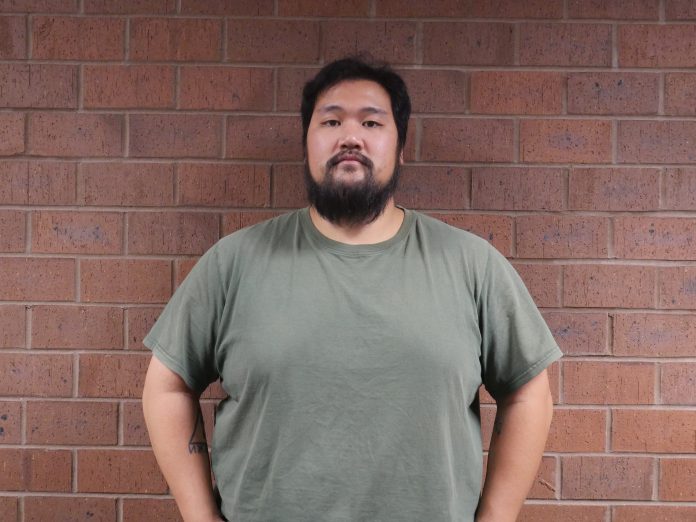Steven Abramo
Staff reporter
As early as the fourth grade, Matt Khamsihong knew he was destined to be in the military.
It wasn’t until he was a junior in high school, though, that his decision became final. After a conversation with a Marines recruiter at Olathe North High School, he made the decision to join the Marines during his senior year of high school.
“That moment was huge for me. I didn’t really understand the whole process of being in the military until I started talking to [the recruiter],” Khamsihong said. “From that point, it all started to develop for me. He told me about how all the hard work that you would do in the military will pay off in the end.”
After graduating, he took a full year off to shed 120 pounds off his then 310-pound frame for boot camp. He said he burned much of his weight “the wrong way,” such as starving himself, spending time in a sauna, even running in the Kansas summer heat wearing a vinyl suit.
“It was a real crash course about getting physically fit,” Khamsihong said. “The time frame I had to shed the weight was all on me. As soon as I was within a standard, I was put through MEPS (Military Entrance Processing Station), had to fill-out paper work, then I had to pick a date to enroll into boot camp.”
Once he arrived at boot camp, he underwent a variety of physical fitness tests, such as a timed 3-mile run. This process, though grueling, helped build up his strength to embark on a two-year long mission in Okinawa, Japan, at the end of July 2010.
While he was stationed there, tragedy struck in the form of the 2011 Tōhoku earthquake and tsunami. He also had to unexpectedly send supplies and food packages to the hundreds of thousands affected.
After the natural disaster, he shuffled in and out of military bases in Okinawa, South Korea and North Carolina for another two years, before leaving the Marines for good in 2013.
“I really wanted to make a career out of being in the Marine Corps,” he said. “But I lost my drive of being in the military after I was unable to get deployed during my first four years. In my mind, I thought if my services weren’t going to be utilized in that way, I felt it was time to leave.”
Once back home, Khamishong didn’t know what to with his life.
“The feeling of me leaving the military didn’t really hit me until a couple months later. When I got back, I was really lost. I was so used to the military lifestyle,” Khamishong said.
He worked with several labor companies across the United States in the years after leaving. During that time, he realized it was time to go back to school.
He admits his view on education wasn’t strong back then, mostly because he had spent eight years away from the classroom. However, he was determined to seek out a fresh start in life.
“It just wasn’t on my radar,” he said. “All I ever wanted to do was be in the military. But I was at point when I realized I needed to go back to school. I needed to earn more qualifications in life.”
He arrived on campus in the summer of 2016, and though it took time to become acclimated to school again, he said felt he confident thanks to the college’s strong support system.
“It was probably the best decision I’ve made. The support here is amazing. I remember the first class I took here overwhelmed me. I wanted to drop the class, but my professor encouraged me to stick with it, so I did.”
Soon after, he continued his studies at the college for the next two years, graduating with an associate degree in Applied Science and Liberal Arts in the spring of 2018. In addition, he is currently pursuing a bachelors’ degree in Public Administration with a minor in Law and Society at the University of Kansas. He plans to be finished next fall.
“The military was a big part of my life, and it’s always going to be that way,” he said. “The exposure and my appreciation for that service, although some of that is bitter-sweet, [is something] I can look back and think of all the good times I had and the people I met. I’m proud of that.”
He currently holds a position at the college, serving as a Veteran Services Intern and an adviser for Peer Advisers for Veterans Education (PAVE). His job focuses on connecting with first-time veteran college students, helping them complete paperwork and teach the benefits of the college.
“I knew people who were homeless, felons, people that came from hate groups. I’m not going to say the military does a complete 180 to people, but I will say that it will change your life. I will always have an appreciation for what this place did to me.”






















